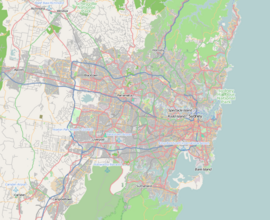
Neutral Bay is a suburb on the Lower North Shore of Sydney, New South Wales, Australia. Neutral Bay is around 1.5 kilometres north of the Sydney central business district, in the local government area of North Sydney Council.

Cremorne is a suburb on the Lower North Shore of Sydney, New South Wales, Australia, located 6 kilometres north-east of the Sydney central business district, in the local government area of North Sydney Council.
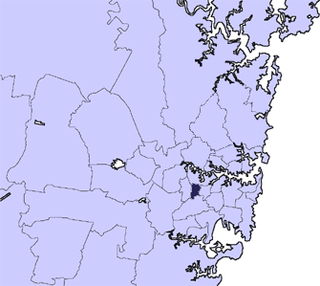
The Municipality of Burwood is a local government area in the inner-west of Sydney, in the state of New South Wales, Australia. The mayor of the Municipality is Cr. John Faker, a member of the Labor Party. The municipality is 7 km2, making it the second smallest Local Government Area in New South Wales, being larger than only Hunter's Hill.
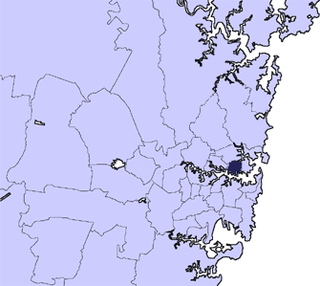
North Sydney Council is a local government area on the Lower North Shore of Sydney, New South Wales, Australia, established on 29 July 1890 through the amalgamation of three boroughs.
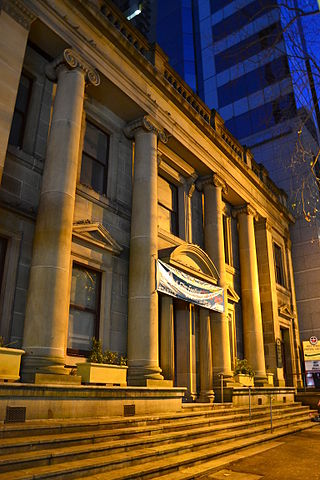
The Pitt Street Uniting Church is a heritage-listed Uniting church building located at 264 Pitt Street in the Sydney central business district, Australia. Founded in 1833, the congregation was the original church of Congregationalism in New South Wales. The church building was designed by John Bibb and built from 1841 to 1846. It is also known as Pitt Street Congregational Church. The property is owned by The Uniting Church in Australia and was added to the New South Wales State Heritage Register on 2 April 1999.

Bertrand James Waterhouse OBE, FRAIA, FRIBA was an English-born Australian architect and artist.

Albert Street Uniting Church is a heritage-listed Uniting church at 319 Albert Street, Brisbane City, City of Brisbane, Queensland, Australia. It was designed by George Henry Male Addison and built from 1888 to 1889 by Thomas Pearson & Sons. It was originally known as Albert Street Methodist Church and Central Methodist Mission. It was added to the Queensland Heritage Register on 21 October 1992.
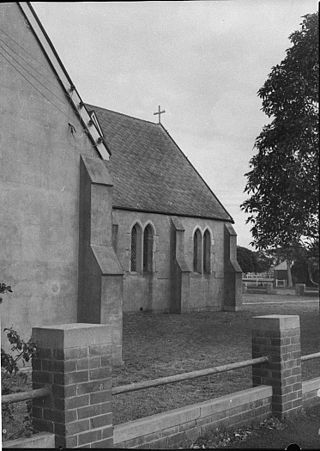
The St John's Anglican Church, formally the Church of St John the Evangelist, also called St John's Cooks Hill, is an Anglican church in Newcastle, New South Wales, Australia. It is the oldest remaining church building in Newcastle, completed in 1860. The building, the design of which is attributed to colonial architect Edmund Blacket, in the Old Colonial Grecian Revival style, is located close to the city centre at 1D Parry Street, Cooks Hill. It was added to the New South Wales State Heritage Register on 2 April 1999.

St Andrew's Uniting Church is a heritage-listed Uniting church at Poictiers Street, Deniliquin, Edward River Council, New South Wales, Australia. It was built from 1876 to 1877. It is also known as the Deniliquin Uniting Church. The property is owned by the Uniting Church in Australia. It was added to the New South Wales State Heritage Register on 2 April 1999.

St Alban's Anglican Church is a heritage-listed Anglican church located at Hunter Terrace, Muswellbrook in the Muswellbrook Shire local government area of New South Wales, Australia. It was designed by Sir George Gilbert Scott and built from 1864 to 1869 by Edmund Blacket, supervised by John Horbury Hunt. It is also known as St. Alban's Anglican Church and St Albans Church. The property is owned by the Trustees of the Anglican Diocese of Newcastle. The church was added to the New South Wales State Heritage Register on 2 April 1999.

St Mary's Anglican Church is a heritage-listed Anglican church and associated facilities located at 240 Birrell Street, Waverley, in the Waverley Municipality, Sydney, New South Wales, Australia. The church was designed by Edmund Blacket and built between 1863 and 1864. It is very well known and sought after as a place to be married and is popular for funerals. The building is also notable due its pipe organ, designed and built by August Gern. The property is used for ministry by the Anglican Parish of Bondi and Waverley, which is an amalgamation of two previous Parishes ; The first Rector of St Mary’s Waverley, Rev Stanley Mitchell, was a keen Evangelical and although he used traditional Anglican liturgy was “low church” like most of Sydney Diocese. However there has been a long history of more “High” Anglicanism and Anglo Catholic theological underpinnings. Since 2014, the church has returned to a strongly evangelical base while running a very strong traditional 1662 prayer book communion service every Sunday. It also has less traditional al services to accommodate more contemporary congregations.
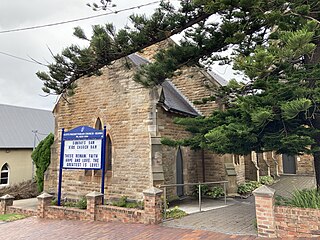
The Scots Presbyterian Church is a heritage-listed Presbyterian church at Shoalhaven Street, Kiama, Municipality of Kiama, New South Wales, Australia. It was designed by Thomas Rowe and built from 1860 to 1863 by builders Moon & Simmons and carpenters Walker Bros. It is also known as Kiama Presbyterian Church. It was added to the New South Wales State Heritage Register on 2 April 1999.
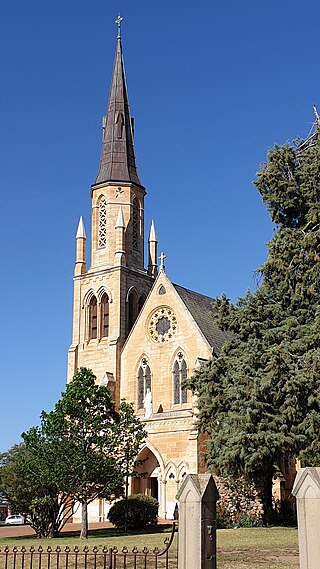
St Mary's Roman Catholic Church, officially, St Mary of the Presentation Church, is a heritage-listed Roman Catholic church at 13 Church Street, Mudgee, Mid-Western Regional Council, New South Wales, Australia. It was added to the New South Wales State Heritage Register on 2 April 1999.
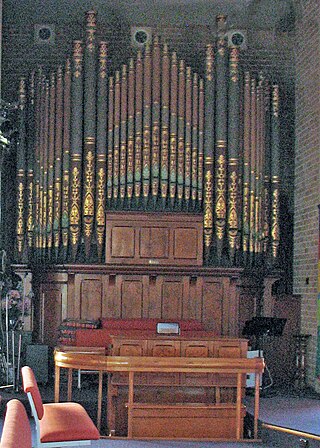
The Galston Uniting Church Pipe Organ or Pipe Organ from Bourke Street Congregational Church is a heritage-listed church pipe organ located at 11 School Road, Galston in the Hornsby Shire local government area of New South Wales, Australia. It was built by Forster and Andrews. It is also known as Pipe Organ from Bourke Street Congregational Church (former) and Forster and Andrews Pipe Organ; Galston Uniting Church Pipe Organ. The property is owned by Uniting Church in Australia. It was added to the New South Wales State Heritage Register on 2 April 1999.

The Chatswood South Uniting Church is a heritage-listed Uniting church at 518 Pacific Highway, Lane Cove North in the Lane Cove Council local government area of New South Wales, Australia. It was designed by Thomas Rowe and possibly a Mr Morrow also and built by Bryson, Leet, Johnson & Montgomery. It is also known as Chatswood South Uniting Church and Cemetery and Chatswood South Methodist Church. It was added to the New South Wales State Heritage Register on 2 April 1999. The property was sold in 2017 for redevelopment.

The Dalkeith Property or simply Dalkeith, is a heritage-listed former meditation centre, residence and Norwegian Seamen's Church, and now residence at 8 Bannerman Street, Cremorne, North Sydney Council, New South Wales, Australia. It was designed by Henry Austin Wilshire and Stone & Siddeley, and built from 1908 to 1910 by (possibly) G. E. Flower. It was added to the New South Wales State Heritage Register on 2 April 1999.

St John's Uniting Church is a heritage-listed Uniting church located at Coonanbarra Road in the Sydney suburb of Wahroonga in the Ku-ring-gai Council local government area of New South Wales, Australia. It was designed by John Shedden Adam and built from 1929 to 1930. It is also known as St. John's Uniting Church, Hall and Manse, Knox Church, Wahroonga Presbyterian Church, St John's Presbyterian Church, WPS and Wahroonga Preparatory School. The property is owned by the Uniting Church in Australia. It was added to the New South Wales State Heritage Register on 19 September 2003.
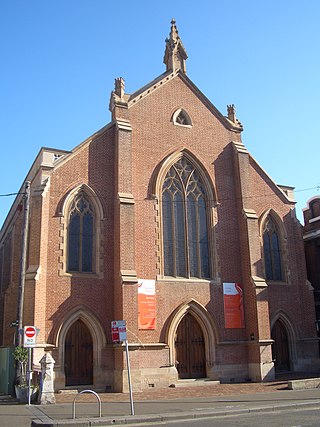
The Newtown Mission Uniting Church is a heritage-listed Uniting church at 280a King Street, Newtown, City of Sydney, New South Wales, Australia. It was designed by George Allen Mansfield and built in 1859 by Thomas Abbott. It was added to the New South Wales State Heritage Register on 2 April 1999.

St Stephen's Uniting Church is a heritage-listed Uniting Church located at 197 Macquarie Street, in the Sydney central business district, in the City of Sydney local government area of New South Wales, Australia. Developed initially as St Stephen's Presbyterian Church, it was designed by Finlay Munro Jnr and John Reid and built from 1935 to 1937 by Kell & Rigby. It was added to the New South Wales State Heritage Register on 3 September 2004.

St Sophia Greek Orthodox Church, officially the St Sophia and Her Three Daughters Greek Orthodox Church, is a heritage-listed Greek Orthodox church at 411a Bourke Street in the inner city Sydney suburb of Surry Hills in the City of Sydney local government area of New South Wales, Australia. Formerly a Congregational church, the building is also known as the former Bourke Street Congregational Church and School. It was added to the New South Wales State Heritage Register on 2 April 1999.

